
Why can't we talk about our history of intoxication? Photograph: guardian.co.uk
Tis the season to be off your head, legally and in a ladylike manner. At the moment there is a lot of focus on the harm that us people (ie, women) do to ourselves with our: "Yay, it's wine o'clock." Or, as the Sun explains: "So many mums open the wine once the kids are in bed. The cork rarely goes back in the bottle."
One might ask why women's lives are so stressful that self-medication is needed, and why alcohol is such an astonishingly cheap way to get wasted. Legally.
I stress legal because the news that government advisers want ketamine reclassified from a class C to B drug is more fiddling while the crack pipe burns. The drug wasn't banned until 2006, but someone who gets caught with it will now face up to five years in prison instead of two. A heavy price, one feels, for the person who wants to anaesthetise themselves of an evening. Send them to prison where drugs are the currency? It's almost as if government advisers don't live in the real world.
Sure, the long-term effects of ketamine (bladder damage) are not nice and I have never doubted that it is dangerous. When I was 16, two boys I knew broke into a veterinary surgery and injected it. The dose was for horses, not humans. They both died stupid, stupid deaths.
Reclassifying it might mean a few students may now think twice. But those who will be thinking really hard are the manufacturers who will design a legal substance that guarantees the effects of ketamine and can be sold online. For this is how prohibition works hand in hand with capitalism and organised crime. Recently, we have all experienced contact highs – cooking up meth (Breaking Bad), cheering on Nigella (coke), Paul Flowers (a vile cocktail of everything and ill- considered banking). We watch Russell Brand's abstinence monologues that do indeed break the barriers of space and time.
There is no joined-up drugs policy. It is rare that I say a good word about George Osborne but, as I have said in the past, I don't care if he took cocaine. Because I don't. And to be fair to Nick Clegg – maybe I really am out of my mind – he admits that in the war on drugs, drugs won, acknowledging that many senior police officers want decriminalisation. Addiction, Clegg declared recently, is a health issue, not a criminal justice one.
Facts remain a dangerous substance in this debate, as Professor David Nutt knows. In 2009, he said that illegal drugs should be classified according to the harm, both social and individual, they cause. Alcohol would certainly have a high classification. Booze and tobacco, he said, were more harmful than LSD, cannabis and ecstasy. So he had to be got rid of, as few politicians ever seem to be able to expand their minds enough to consider actual evidenced-based policy-making.
Decriminalising certain drugs would inevitably mean misuse. But the unsayable thing is that many of us use drugs, legal and illegal, at certain stages in our lives. And enjoy them.
Instead, however, we hand over the trade to organised crime, which is why Mexico is in the state it is now, upping its poppy production massively. We have spent 10 years trying to bomb or bribe away the only cash crop the Afghans can grow (the opium poppy). What do we want them to sell? Cabbages? This year is a record one for the crop, produced mainly in Helmand, so that has really worked.
You may be the sort of person who does not want to drink or take drugs. You may not wish to expand your mind, or lose it. You may not want to connect the handing-out of mood-altering SSRIs (selective serotonin reuptake inhibitors) with kids smoking skunk and mums' little wine clubs. You may think it's no longer cool to neck any pills other than statins. You may want to move to Uruguay, which has just legalised marijuana, though I can't think of anything worse than being in Montevideo with a load of gap yahs. It's not my drug of choice, as I like things that make you want to talk.
I would like the real drug conversation, not the gurning, coked-up, aren't-we-amazing one. Not the one where Tulisa is a threat to civilisation. Why can't we talk about our history of intoxication, personal and political? Those who make the laws that would make me a criminal are not coherent in their logic. They are cowards, afraid of a media that is neither clean nor sober. Drugs, legal and illegal, are a fact of life. Even life-enhancing. There will be casualties of drugs but there are casualties of not facing reality. Both need to be managed. Honestly, I really cannot snort another line of this hypocrisy.

